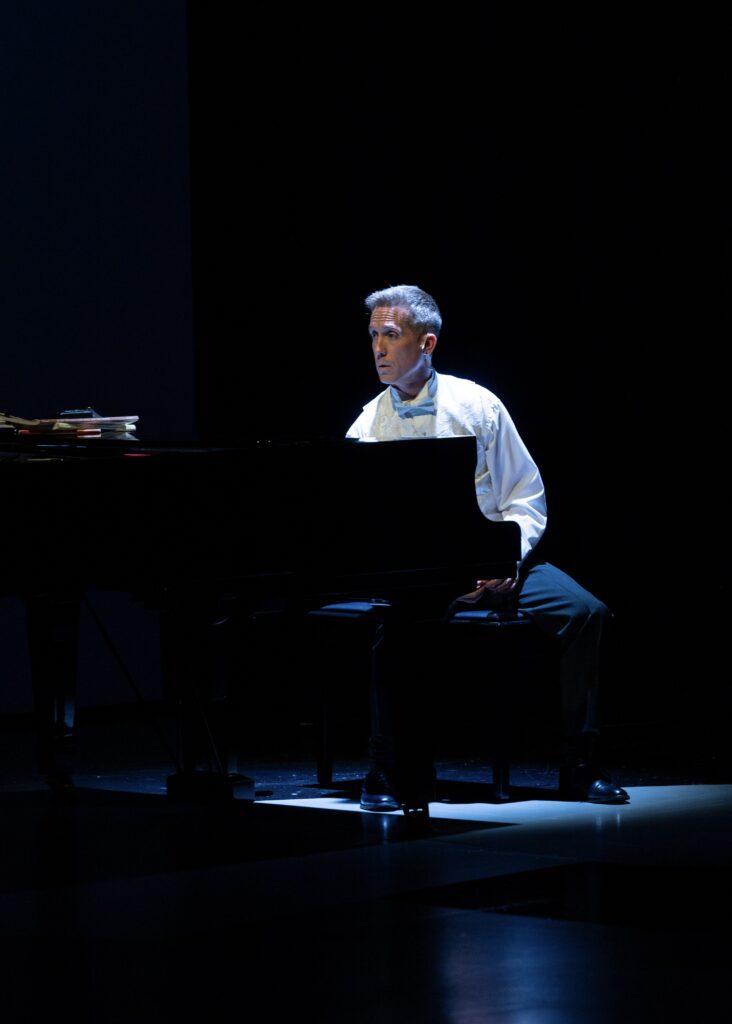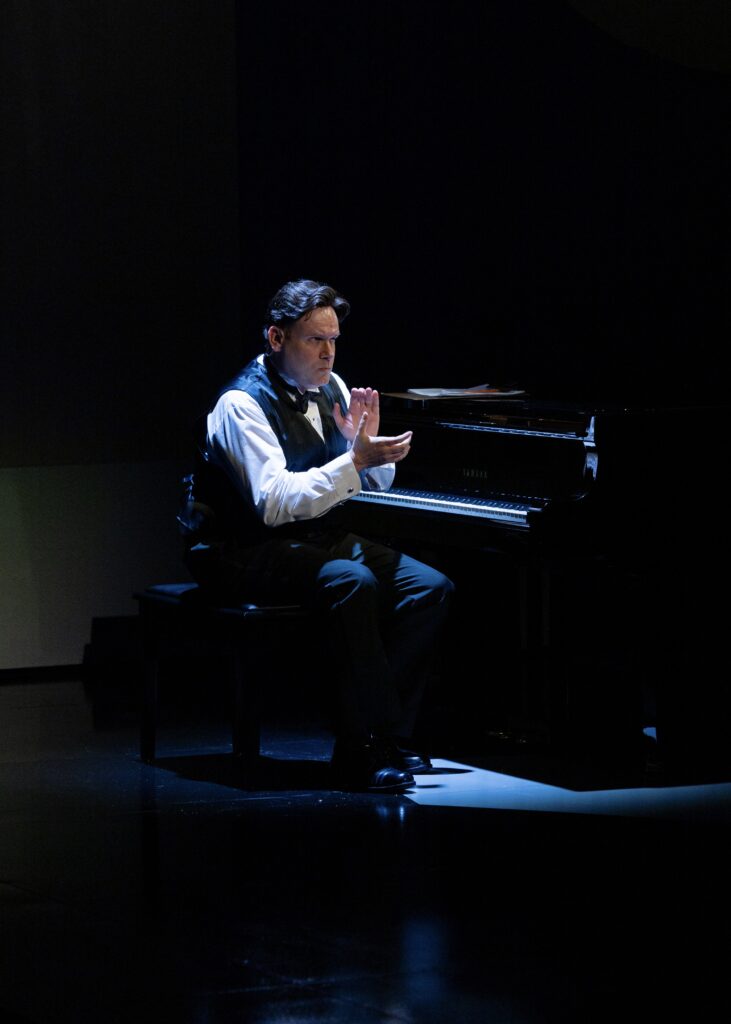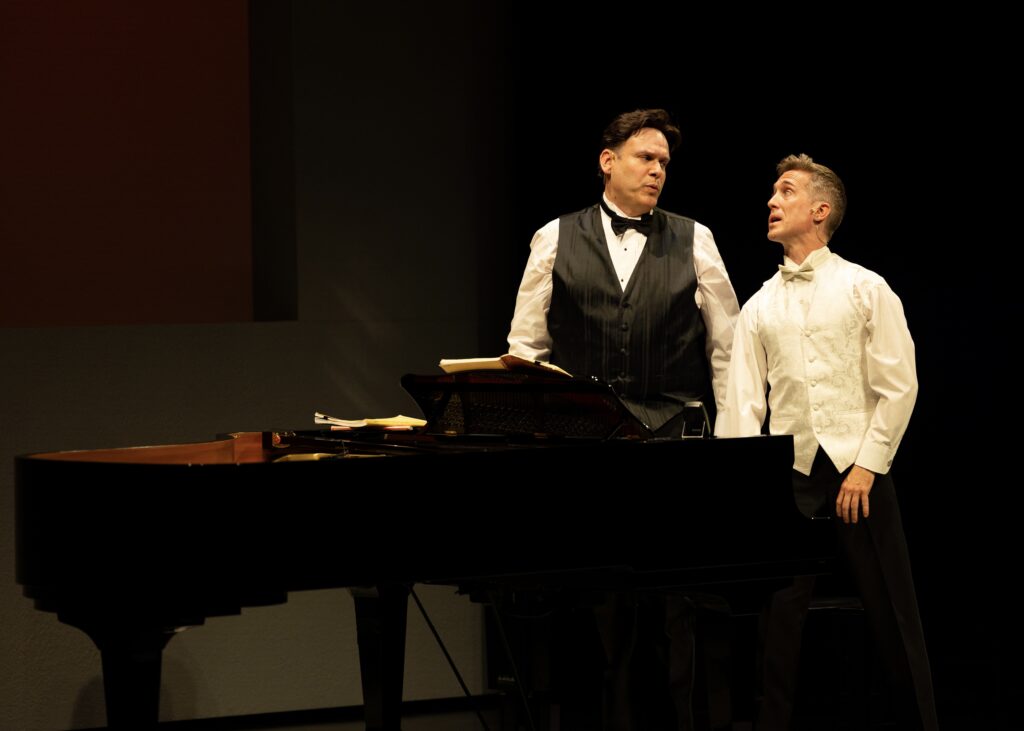Pioneer Theatre Company’s (PTC) 64th season is slated to be an especially musical one and its Utah premiere production of the Canadian jewel 2 Pianos 4 Hands (2P4H) is an impressive opener that is the epitome of virtuosic timing.
Actor-pianists Richard Todd Adams and Matthew McGloin romp, run, rhapsodize and enchant on the Meldrum Theatre stage at the University of Utah in the respective roles of Ted Dykstra and Richard Greenblatt, the musicians who wrote the show for themselves some thirty years ago. This whipsmart 30th anniversary production is directed by Tom Frey, who also has performed variously both roles in the show more than 600 times, along with helming more than 20 productions.

It is the collective experience of this duo of performers and the director that makes the outcome gratifying and astonishing. 2P4H requires extraordinary multitasking demands of landing the rapid-fire impact of the comedy, the occasional moments of emotional pathos, and the seamless segues in the tour de force musical counterpoint with exacting standards of timing. And, all of this occurs while both actors switch up in an instant’s notice to one of a total of some two dozen characters.
The premise is elegant and simple. Dykstra, an Edmonton native, and Greenblatt, originally from Montreal, wrote the show, based on their experiences of piano lessons and family life in their childhood and their aspirations of becoming classical music soloists, only to quit that dream when they reached the age of 17. While this two-hander is about pianists in particular, the show’s thematic undercurrents are clear and familiar to anyone who has ever realized that they will never achieve greatness in their first choice of pursuits but who eventually find heartening success in another setting.
The show is a string of short stories to which any musician can relate: oddball music teachers without particularly imaginative pedagogy, parents who think they know everything or use music lessons as a cudgel to threaten or punish the child, unflinching gatekeepers of music tastes and classical purity who dare not mix genres, the unbalanced sacrifices of time that prevents kids from hanging out with friends or playing outside, the mind-numbing pains of practicing and woodshedding difficult music passages, public performance meltdowns and the relentless difficulties of learning music theory, sight reading and ear training.

There also are ignominious bits that a musician might encounter who hasn’t notched the golden ticket to a solo career, such as the belligerent drunk who can’t recognize that Billy Joel’s Piano Man has already been played or the woman who takes piano lessons not to appreciate the ideal of learning music, but instead as therapy sessions that would be more appropriate for a psychologist to handle.
In the first act, there is the brilliant extended ping-pong scene capturing the comparably frustrating experiences of both musicians, featuring the famous first movement of Mozart’s piano sonata in C major. The work is known as ‘Sonata facile,’ written in 1788 but it was not published until some 14 years after Mozart’s death in 1805. Mozart did not come up with its ‘easy’ nickname, although the composer did identify it as “a little piano sonata for beginners.” In fact, sonatas like this were composed purposefully to be easy so that music publishers could sell the sheet music to amateur pianists so they could play it at home.
However, as any student who has ever learned the piece has discovered, it is hardly easy to play because every damn note is so transparent and exposed that a mistake would stick out immediately. Playing Mozart has never been conducive to the wonderful Japanese concept of wabi-sabi that celebrates the joy of an imperfection.
2P4H strikes the right nerve, for many reasons. One important reason concerns the humanizing of musicians. Even famous soloists feel objectified in the musical environment and profession. Idolizing audience members occasionally ascribe superhuman traits to great musicians. One might romanticize that a musician either has a divinely bestowed gift or has made a pact with the devil or with some supernatural entity.

But even great musicians remind us of the virtues of practicing but not in the way we typically believe can instill the right balance of self-confidence and discipline. In 2P4H, in recounting the drudgeries of their practicing, the musicians demonstrate that practicing should not be an autopilot exercise that focuses only on fixing wrong notes or speed bumps in the most difficult passages of the music. As internationally known cellist Sheku Kenneth-Mason, who comes from a famous family of musicians, explains, practicing should never be tedious but instead it can be a luxurious process of exploration. He adds, “Always, as often as possible, remind yourself of why you love music and what’s important about it, and [don’t] lose sight of the importance of communicating music that can hopefully impact the audience that you are playing to. It can hopefully impact their life.” That sentiment translates easily to an aspiring athlete, actor, artist, scientist, filmmaker, lawyer, engineer, chef, etc.
And, if that impact does not lead necessarily to a Carnegie Hall debut, then follow the example of Dykstra and Greenblatt, who have created a phenomenal stage show that reminds all of us why we humans truly love music.
The production continues through Sept. 27. For tickets and mod information, see the Pioneer Theatre Company website.
